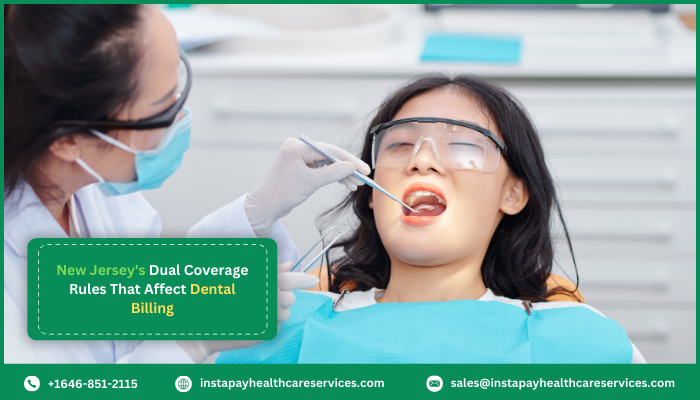
New Jersey's Dual Coverage Rules That Affect Dental Billing
For dental practices in New Jersey, handling patients that have dual dental insurance is more common than ever. But with this dual dental insurance comes a complex layer of Coordination of Benefits (COB) rules. If not handled properly, these can lead to delayed payments, denials, or patient dissatisfaction. Understanding how New Jersey insurers handle primary vs. secondary coverage is critical for billing accuracy and financial performance.
What Is Dual Coverage in Dental Insurance?
Dual coverage occurs when a patient is covered under two dental insurance plans—typically through their own employer and as a dependent on a spouse or parent’s plan. While this might seem like a benefit for the patient, it creates significant billing challenges if practices don’t know how to coordinate benefits properly.
Primary vs. Secondary: How New Jersey Rules Apply
New Jersey does not have state-specific COB mandates for dental billing, but insurers licensed in the state follow National Association of Insurance Commissioners (NAIC) COB guidelines. Here's how that works:
- Birthday Rule : For dependents (e.g., children), the plan of the parent whose birthday falls earlier in the calendar year is considered primary.
- Non-Dependent vs. Dependent : The patient's own insurance is always primary over coverage as a dependent.
- Active vs. Retired Plan :If one plan is for a currently active employee and the other is for a retired one, the active employee plan is primary.
- Medicaid Consideration : Medicaid is always the payer of last resort—never bill it first.
Common COB Mistakes That Delay Payments
- Submitting to the Wrong Insurer First: Many denials stem from practices billing the secondary plan before the primary, resulting in automatic rejections.
- Missing Explanation of Benefits (EOB): Secondary payers often require a copy of the EOB from the primary insurer. Omitting this can halt claim processing entirely.
- Assuming Coordination Happens Automatically: Many dental offices assume the two insurers will “talk” to each other. They won’t—you must coordinate the paperwork manually.
- Not Verifying COB Annually: Patients’ coverage can change yearly. Practices that don’t verify COB at each visit risk sending claims to the wrong insurer.
Best Practices for Billing Efficiency in NJ Dental Offices
To stay ahead of COB complications, consider the following tips:
- Use a Verification Checklist: At every patient visit, confirm the primary and secondary coverage using a standard form or EHR prompt.
- Automate COB Tracking: Leverage dental billing software that flags dual coverage and requires EOBs before sending claims to secondary insurers.
- Train Your Front Desk and Billers: Make sure your staff understands COB rules and knows how to explain dual coverage to patients.
- Partner with a Billing Expert: Working with a dental billing specialist like Instapay Healthcare Services ensures that your claims are submitted cleanly, your EOBs are tracked, and your payments are accelerated.
Get Paid Faster with Fewer Headaches
In New Jersey’s changing dental environment, even the smallest of COB errors can cause major revenue disruptions. By understanding the rules and optimizing your dental billing workflow accordingly, your practice can avoid common mistakes and improve cash flow. At Instapay Healthcare Services, we help dental practices across New Jersey master the art of clean claims and proper COB handling.
Contact Instapay Healthcare Services today to learn how we can streamline your dual coverage billing and help you get paid on time, each time.




